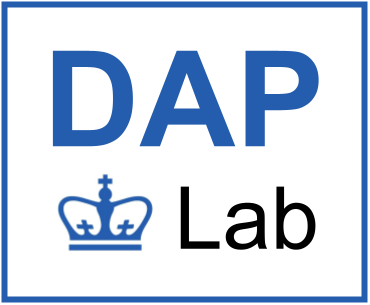
The Data, Agents, and Processes Lab (DAPLab) at Columbia University is building the foundations for a future where AI agents safely and reliably automate complex work. We bring together researchers in data systems, applied AI, operating systems, HCI, algorithms, and business to invent the infrastructure, algorithms, and design principles needed to deploy agents in the real world.
Our work spans the full stack—from systems and training frameworks to human–agent interaction, process automation, and digital twins. We build open-source tools, collaborate closely with industry partners, and prototype agentic technologies that reimagine how work gets done. Based in the heart of New York City—home to some of the world’s largest enterprises—we are uniquely positioned to explore how agent automation transforms real organizational processes. DAPLab is a home for students, researchers, and partners who want to shape the next generation of AI-native systems.
For more information about the lab, please contact ewu@cs.columbia.edu
News & Education
A one-day workshop in New York City (May 8, 2026) bringing together ML, systems, and HCI researchers to discuss reliable, scalable, and debuggable AI agents. Talks, posters, and demos. See the website for details.
Spring 2026 AI Entrepreneurship Series
The DAPLab is organizing a series of events that bring together Columbia students, faculty, and industry partners to discuss the process of transitioning lessons from research and the classroom into products and value.
DAPLab Receives Microsoft Azure Credit Award
DAPLab has received a $250K Microsoft Azure credit award through the AARI program to support research on robust generalization in agentic AI. The funding enables work on environment scaling and diversification to improve the reliability of agentic systems in real-world deployments.
Spring 2026 DAPLab Research Seminar
The DAPlab’s Tuesday 12PM research seminar in CSB 453 (CS Conference Room) invites speakers that can share cutting-edge agent-systems research or can talk about processes in their organizations and how they are trying to automate them.
Student Honors & Fellowships
Celebrating recent student recognitions: IBM PhD Fellowship (Jerry Jiaxiang Liu), AI & Autonomous Fellowship (Alex Jiakai Xu), and CRA Outstanding Undergraduate Researcher Honorable Mention (Tianle Zhou).
Events
-
2026-04-21
Scalable Image AI via Self-Designing Storage Utku SirinImage AI is very expensive. We show that the root cause of the problem is a long-overlooked an...
-
2026-03-19
AI Attacks Neil Daswani, Firebolt VenturesWe’ve officially entered the era of non-human adversaries, where AI doesn’t just assist hacker...
-
2026-03-05
Scaling RL Rollouts: Agent-Native Infrastructure with Daytona Ivan Burazin, DaytonaIn this talk, we’ll outline why a new class of agent-native infrastructure is emerging, what p...
-
2026-02-19
A Talk about Structured Template Labs Amit Agrawal, Structured Template LabsThis talk will provide insights into building and scaling enterprise software companies, from ...
Publications
-
May 2026, AISTATS 2026
Panprediction: optimal predictions for any downstream task and loss -
May 2026, AISTATS 2026
Prior makes it possible: from sublinear graph algorithms to LLM test-time methods -
Feb 2026, ALT 2026
Group-realizable multi-group learning by minimizing empirical risk -
Jan 2026, CIDR 2026
Please Don't Kill My Vibe: Empowering Agents with Data Flow Control -
Dec 2025, NeurIPS 2025 Position Paper
LLM Generated Persona is a Promise with a Catch -
Dec 2025, LAw Workshop at NeurIPS 2025
Agents for Web Testing: A Case Study in the Wild -
Dec 2025, NeurIPS 2025
Data Mixture Optimization: A Multi-Fidelity Multi-Scale Bayesian Framework













